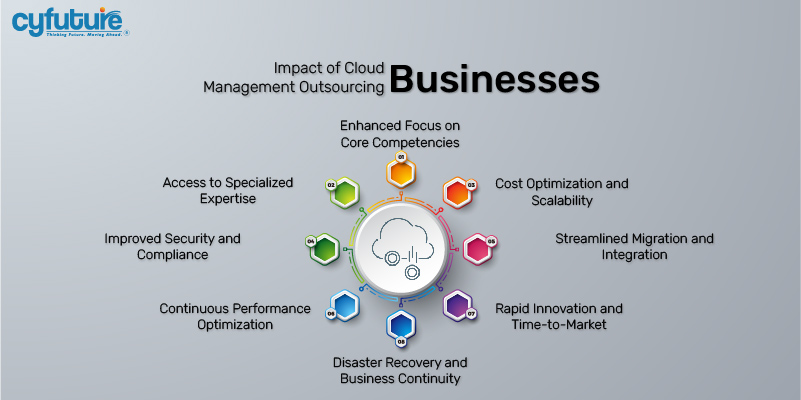-
Get Cloud GPU Server - Register Now!
Toggle navigation

It takes more than just keeping up with the latest trends to be competitive in today’s rapidly evolving business environment; you also need to make wise decisions that might propel your company forward. Cloud management outsourcing is one of these calculated strategies that businesses are using more and more. Using cloud infrastructure services through outsourcing has emerged as a game changer for organizations of all types as the digital world becomes increasingly interconnected and complex.
However, why is cloud management outsourcing a smart choice? How does it support the success of your company?
Furthermore, efficiently shifting from traditional IT management to cloud-based solutions is not just a trend; in today’s cutthroat industry, it is a must. With cloud management outsourcing, businesses can concentrate on their core competencies while utilizing expert talents, scalable infrastructure, and affordable solutions.
In this comprehensive article piece, we’ll examine how cloud management outsourcing may improve agility, stimulate innovation, and help businesses streamline their IT processes in this piece. By utilizing outside expertise and resources, organizations may navigate common challenges associated with cloud adoption while creating new opportunities for growth and success.
Find out how cloud management outsourcing may revolutionize your organization. Learn how, in today’s digital world, strategic outsourcing fosters development, streamlines processes, and fosters innovation. Benefits include increased focus on fundamental abilities, easier access to specialist knowledge, cost savings, and assurance of security and compliance.

Businesses may refocus internal resources on their strategic ambitions and core competencies by outsourcing cloud administration. To streamline operations, boost productivity, and encourage innovation, routine tasks like infrastructure supply, monitoring, and maintenance may be assigned to qualified service providers.
Organizations may boost productivity and foster innovation by assigning skilled service providers to handle routine tasks like infrastructure supply, monitoring, and maintenance. By facilitating long-term growth and establishing a competitive edge, strategic resource management helps companies adjust to shifting market conditions.
You may not have internal access to the expertise and skill pool that outsourcing cloud management provides. Expert service providers provide a deep grasp of cloud technologies, industry trends, and best practices to deliver the best possible performance, reliability, and security of IT infrastructure. Furthermore, outsourcing provides businesses with access to state-of-the-art technology such as artificial intelligence, machine learning, and data analytics, allowing them to spearhead digital transformation initiatives and get practical insights.
There are significant cost and scalability benefits to cloud management outsourcing for businesses of all sizes. Businesses may choose to adopt a pay-as-you-go strategy, where they only pay for the services and resources they use, as an alternative to racking up significant upfront expenditures for infrastructure equipment and software licenses.
This results in cost certainty, scalability, and operational efficiency, allowing businesses to quickly expand their IT infrastructure in response to changing business requirements and demand patterns.
When it comes to organizations working in the digital space, security and compliance are the most important factors. The integrity, confidentiality, and availability of sensitive data and applications are guaranteed by the strong security measures, cutting-edge threat detection systems, and regulatory compliance frameworks that are made available through cloud management outsourcing.
To reduce cyber risks and prevent data breaches, seasoned service providers use strict security measures, encryption techniques, and access restrictions. This builds confidence and trust with stakeholders and consumers.
Due to the numerous challenges and complexities involved, businesses may find it challenging to integrate heterogeneous systems and move their present workloads to the cloud. Cloud management outsourcing helps companies with every stage of the process, from planning and assessment to execution and optimization, by offering comprehensive migration and integration services.
Service providers use automated technology, tried-and-true procedures, and knowledgeable staff to facilitate seamless cloud migrations, minimizing downtime, lowering risks, and optimizing return on investment.
Monitoring, performance improvement, and ongoing study of the IT infrastructure are all part of outsourcing cloud management. Service providers use sophisticated analytics platforms and monitoring tools to proactively identify bottlenecks, manage resource use, and enhance system responsiveness and reliability.
By continuously optimizing cloud settings, businesses can ensure maximum performance, scalability, and user experience based on real-time data and performance metrics. Customer satisfaction and operational excellence follow from this.
Innovation and speed-to-market play a major role in determining success in today’s hectic business climate. Cloud management outsourcing accelerates innovation cycles by providing access to state-of-the-art technology, agile methodologies, and development frameworks.
Service providers enable businesses to quickly create, test, and implement new applications and services, enabling them to quickly adapt to changing customer demands and market conditions. By exploiting the scalability and agility of cloud platforms, organizations may gain a competitive advantage in highly competitive marketplaces and speed the delivery of value to customers.
A strong IT infrastructure management strategy must include preparations for business continuity and catastrophe recovery. Cloud management outsourcing offers robust disaster recovery solutions using geographically dispersed data centers, redundant infrastructure, and automated failover procedures to ensure business continuity in the event of natural disasters, hardware failures, or cyberattacks.
Service providers offer comprehensive disaster recovery plans that are tailored to the unique needs and risk profile of each business. These plans contain mechanisms for failover, replication, and data backup. By delegating critical disaster recovery tasks to trained professionals, organizations may minimize data loss, and downtime, and retain operational continuity while safeguarding their revenue streams and reputation.
Due to the existence of cloud management outsourcing, businesses may choose from a range of cloud service providers and deployment models, including public, private, and hybrid clouds. Businesses may select the finest cloud platforms and technologies for their requirements, performance targets, and budgetary constraints by using vendor-neutral solutions from service providers.
Because of this vendor neutrality, businesses may reduce vendor lock-in, improve interoperability, and boost cost-effectiveness—all the while maintaining the flexibility to adapt to shifting market trends and requirements. With cloud management outsourcing facilitating the deployment of a multi-cloud strategy, businesses may use the unique benefits of several cloud providers, mitigate risks related to specific suppliers, and optimize their IT expenditures for long-term success.
To summarize, cloud management outsourcing is a strategic need for businesses wishing to take full use of cloud computing while handling the complexities and challenges of IT infrastructure management. Forming partnerships with seasoned service providers can offer organizations many advantages, including cost optimization, scalability, security, seamless migration, continuous performance optimization, rapid innovation, disaster recovery, business continuity, flexibility, and vendor agnosticism.
Additionally, specialized knowledge can be accessed by organizations. Cloud management outsourcing will play a major role in shaping the future of IT infrastructure management as companies adopt cloud technologies as catalysts for innovation and growth and move through the stages of digital transformation. This will make it possible for companies to thrive in a fiercely competitive and linked international market.
Cloud management outsourcing offers significant cost advantages when running cloud infrastructure outside as compared to internally. Using a pay-as-you-go approach, which also offers scalability and predictable monthly expenses, businesses may avoid making upfront investments in technology, software, and labor. In the long run, outsourcing reduces operational costs since it eliminates the need for ongoing maintenance and enhancements.
Reliable cloud management providers prioritize data security and compliance. Strong security measures are in place to guard your data against breaches, unauthorized access, and cyber threats. Access controls, encryption, and regular audits are some of these techniques. Their attention to industry principles and standards ensures compliance with laws and regulations concerning data privacy.
Cloud management outsourcing fosters rapid innovation by providing access to cutting-edge technologies, development frameworks, and expertise. Service providers provide DevOps principles, agile methodologies, and cloud-native solutions to speed up the creation and implementation of new apps and services. Agility gives businesses a competitive edge in the market by enabling them to experiment, iterate, and provide value to customers more quickly.
Yes, outsourcing cloud administration may be advantageous for businesses of all sizes, from start-ups to multinational conglomerates. Service providers offer scalable solutions that are tailored to the particular needs, budgetary restrictions, and growth path of each company. Whether your objectives are to boost security, encourage innovation, or reduce costs, outsourcing cloud management may help you achieve your business goals more successfully and affordably.